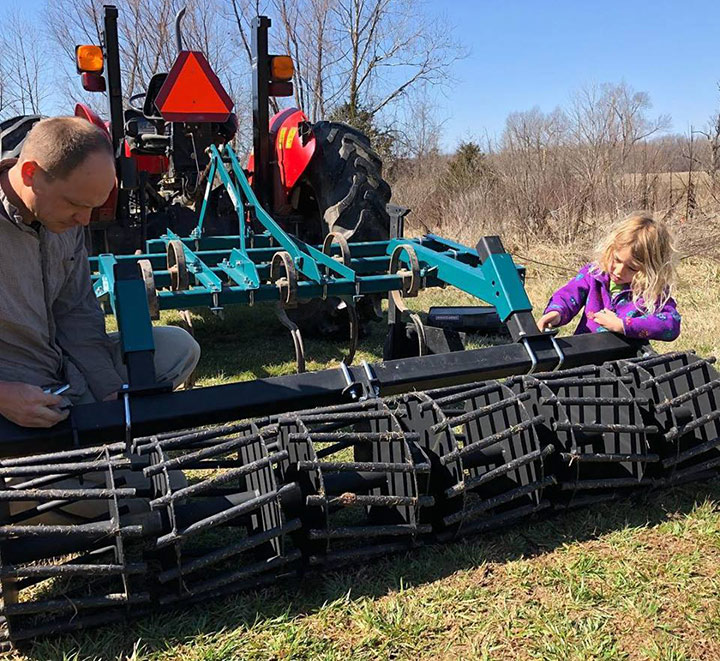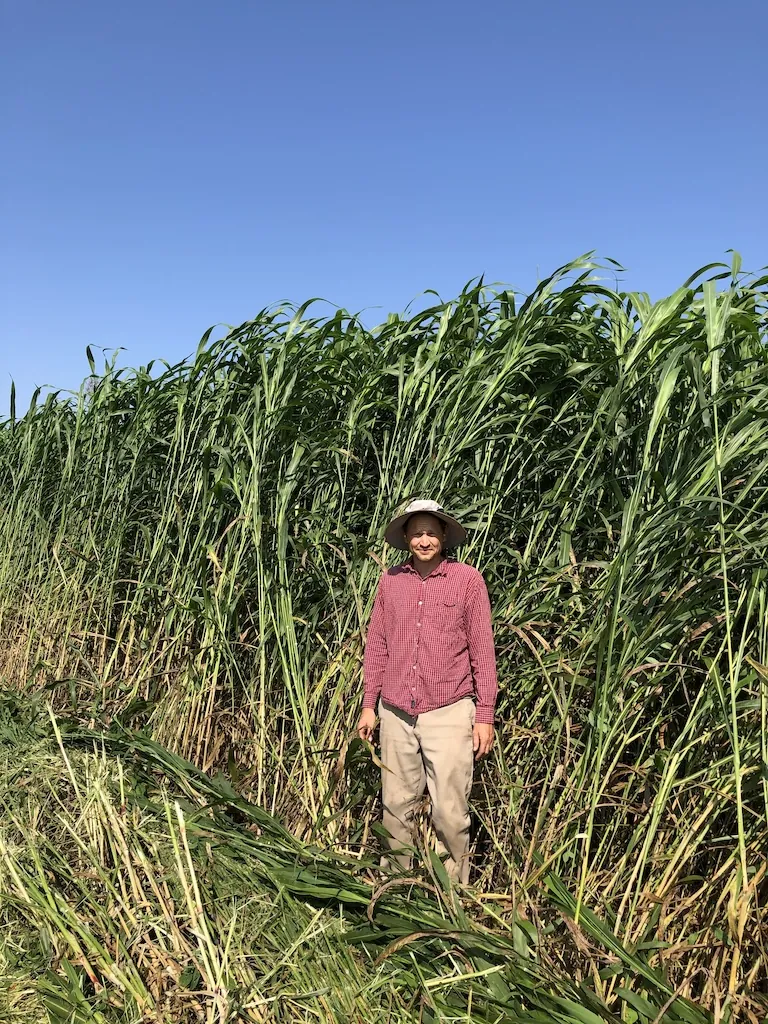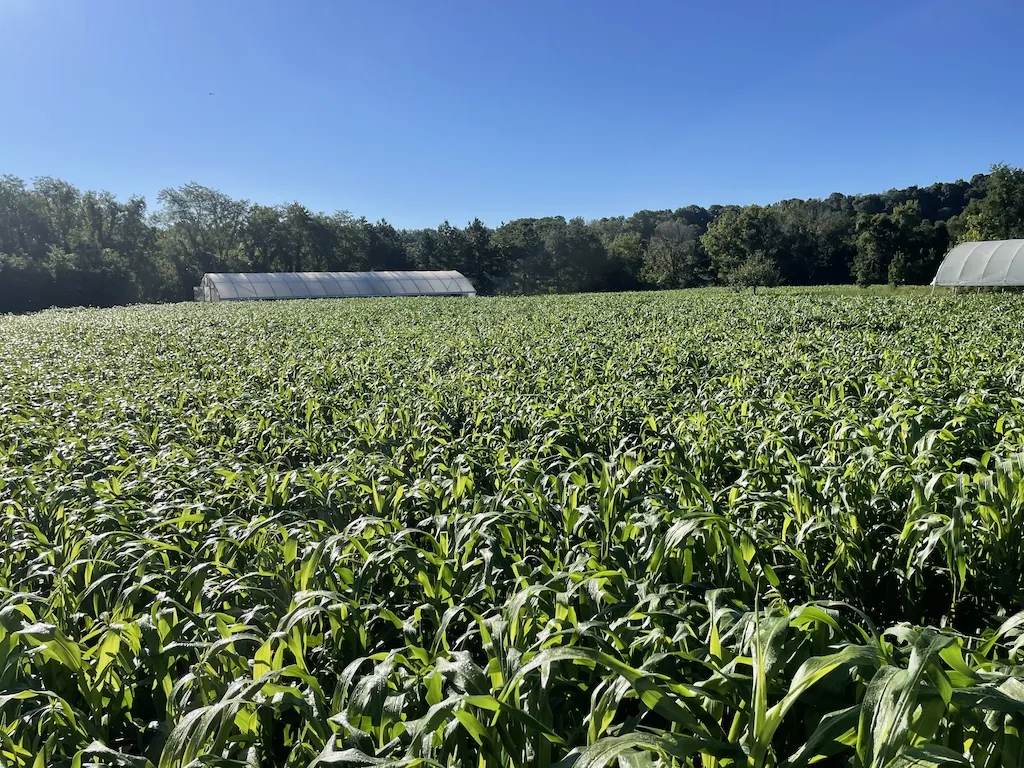By Clare Boland, Communications & Outreach Fellow, and OFRF staff
Three Springs Farm is a certified organic farm located in eastern Oklahoma in the Ozark Hills. Farmers Mike Appel and Emily Oakley cultivate over forty different crops and more than 150 individual varieties on three acres of land. Their goal is to maintain a family operation that demonstrates the economic viability of small-scale farming.
Originally, Three Springs sold the majority of their produce at farmers’ markets, but since the pandemic, they’ve transitioned into being majority Community Supported Agriculture (CSA). Instead of giving customers a pre-packed box like a traditional CSA, they offer a free choice model, allowing customers to pick what veggies they want to receive at their weekly pick-up in Tulsa. CSA members also receive a newsletter containing recipes, photos, and stories from the farm. “It’s non-traditional, but we still have that community support,” says Mike. In addition to their CSA, they also sell wholesale to a restaurant and a Food is Medicine Program.
For Mike and Emily, farming organically was their intention from the start. Both studied agriculture in college, and afterward gained experience working at organic farms like Full Belly Farm in California. After Emily finished her graduate degree at the University of California-Davis, they relocated to Oklahoma, where Emily was raised, to start a farm of their own.
But finding a permanent home for their farm took a bit longer than they had hoped. They looked at more than 100 properties over the course of three years. During this time, they farmed on leased land, but were unable to become certified because of soil amendments used on the land prior to their lease. Eventually, they found land in Eastern Oklahoma, about an hour east of Tulsa, where they have been farming for the past 22 years.
“Oklahoma is really difficult because there’s not a lot of good soil,” Mike explains. “The best land tends to be river valleys, but they’re prone to flooding. Or, there might be really great land but no water. The best land we saw was south of Tulsa, but it was too expensive for us. We were at the eleventh hour when we just kind of stumbled upon our place.”
Why Organic
The land they purchased hadn’t been farmed before, so they didn’t have to go through the three-year organic transition period to obtain organic certification. “It’s why we do what we do,” Michael said when asked about the decision to be certified organic. “There was never a question of doing anything other than that… We actually don’t need it for marketing purposes.”
Despite that, Mike says their CSA customers are still interested in the organic label – what it means and the integrity behind it. He also thinks the bashing of big organics doesn’t do a lot to support the label overall. “When you’re doing that consistently, the consumer doesn’t understand and is going to equate organics as something that is fraudulent. That’s a worry. It has to be a lot more delicate and balanced. There are a lot of us out there doing it right. There’s a lot of concern, and I think we’re riding a very fine line of losing consumer support if we don’t make integrity and strict standards the priority.”
In addition to being USDA-certified organic, Three Springs Farm is also certified through the Real Organic Project. Emily served on the National Organic Standards Board from 2016-2021 and advocated against the inclusion of hydroponic vegetables under the USDA label. The USDA’s decision to include hydroponics was what led to the founding of the Real Organic Project, where Emily currently serves on the standards board. The Real Organic Project label goes beyond the USDA organic label, differentiating organic food produced in concert with healthy soils and pasture, and offering customers greater transparency.
Mike’s top reasons why people should choose organic whenever possible start with the obvious. “You don’t want poisons in your food. That to me is fundamental. We don’t want to eat food grown with chemicals and we don’t want other people to either.
“Also, farmworkers shouldn’t be working in fields that have nasty chemicals. We have a long way to go to ensure people have good working conditions, but at least we can ensure people aren’t being exposed to bad chemicals when they’re growing our food.”
Then there are the larger environmental impacts. “Living near a creek and seeing the life that’s there is incredible. While it is resilient, it’s also very vulnerable to our influences. It’s important to make sure your food choices don’t impair that. When we buy organic, we think beyond ourselves. Our choices have huge impacts in other parts of the world. Just try to make the best choices you can with what you have in front of you.”
Cover Cropping for Scale and Climate Extremes
Although Mike and Emily own around 100 acres, they only keep three to four acres in production since it’s just the two of them and their daughter. The majority of their land is in conservation for wildlife habitat and native ecosystem restoration. Determining the right schedule for their cover cropping has helped not only to build biomass, but also to manage their farm with minimal staff.
”Anything that was spring crops gets turned into a summer cover crop. And then any land that isn’t gonna be utilized at all that year is also in summer cover crop. We end our season on Labor Day to get our winter cover crop planted. So we spend most of September, and a little bit of October, cleaning up fields and just selling to the restaurant and the Food is Medicine program.” The goal, Mike says, is to get the entire farm into cover crop by mid-fall. “Over time, we’ve figured out how to sustain the farm as two people; not growing year-round is one way to do that.”
Though, climate irregularities have caused them to adapt their plans season to season. “ Our falls have been a lot drier, so we’re not able to plant until we get a rain, and those rains haven’t been coming until October. So we’ve modified our winter cover crop a little bit because of that, adding more winter-hardy [varieties].”
In addition to fall droughts, they’ve also been experiencing heavy rains in the spring. This past year was “the wettest spring we’ve ever had, which is saying a lot for this region because we have pretty wet springs. We get pretty severe storms. It’s usually a deluge. And this spring was the worst in our 20 years of farming. We just could not get back into the field. And there were a lot of disease problems in our potatoes and onions because of it.”
Along with the changes they’ve made to their cover crop mix, Mike and Emily are also experimenting with reduced tillage to combat climate extremes. This year, instead of rototilling their summer crop prior to winter planting, they tried discing it in instead. “We’re really happy the way that turned out. The soil is a lot less abused when we don’t rototill.” In the coming year, they are hoping to experiment with interseeding, planting cover crops alongside cash crops, to combat soil erosion and build resilience for rain events.
Learning Through On-Farm Research
Mike and Emily have also developed a good relationship with Oklahoma State University. “We’ve done some varietal trials with them, which helped us figure out what works,” says Mike. “What’s been interesting is to see the extension agents become more interested in cover cropping. They’re still very conventional, but they’ve become more interested after seeing what cover crops have done for us—the fact that we’re organic, our plants are healthy, and our yields are good—without having to put down chemical fertilizers.”
“We’re a bit far away from the university, so it makes it harder to collaborate, but we’ve told them to call us whenever they do variety trials. We have lots of ideas and have trialed a bunch of different crops.”
His best advice for new farmers? Perseverance.
“There are times I’ve definitely wanted to just throw in the towel. But in the end, things work out. You talk to people, figure out the problems. Each year it gets better, but you’ll still have setbacks, like the weather for us this year. Know that while nothing is static, each year you’ll be able to build on your experience.”





